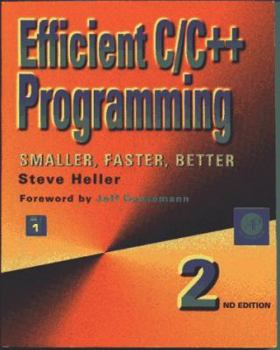Efficient C/C++ Programming: Smaller, Faster, Better
Presented at the algorithmic level, this book provides C and C++ programmers with tools for optimizing their code. Explanations are provided for how to re-think and re-cast applications to make them... This description may be from another edition of this product.
Format:Paperback
Language:English
ISBN:0123390958
ISBN13:9780123390950
Release Date:January 1994
Publisher:Academic Press
Length:415 Pages
Weight:2.00 lbs.
Dimensions:1.2" x 7.5" x 9.2"
Customer Reviews
2 ratings
It provides plenty to study for a stay on a desert island.
Published by Thriftbooks.com User , 28 years ago
Heller's book is nothing if not grounded onactual problems he has encountered in a career as a programmer.Heller presents actual test results, comparing various approaches. Heller cites specific articles (where available) documenting the algorithms chapter examples are based upon. When articles are not available, he spends time explaining the algorithms. If my inter-library loan privileges at the Downey City Library were not already at their maximum order level, all of the journal articles cited in EC/C++P would already be on order. Chapter 5 goes deeply into an example of a token threaded little language, providing one of the best explanations of token threading I've encountered. Heller has a history of work in this area, as can be verified by articles he has had published in "Computer Language" magazine. ("OMNI: One person's language", Dec., 1984, pp.58-62, "Design Your Own Language", Jan., 1986, pp.61-63) The results from this chapter should be wider known; maybe more work in this area could justify an article in the Forth Interest Group's journal where this sort of topic is hotly discussed. It also touches on an article I saw recently, something to the effect of "Unified Memory: Not So Crazy After All?". (this all ties together, believe me!) Chapters 4, 5 and 7 get into assembly language. This didn't really spoil things for me, because it was in the context of the overall project of the chapters. The main emphasis throughout the book is on getting the algorithms out of papers and into working code. The "Entropy barrier" for sorting is shattered most logically. Peter van der Linden, of SUNSoft, once picked hashing as his "Desert Island Algorithm". EC/C++P provides plenty to study for a long stay. In short, the benefits from reading the book may have differed somewhat from the reasons I started reading it, but were real none the less. reviewed by Dallas E. Legan aw585@lafn.org dlegan@heart.engr.csulb.edu delii@sc.liberty.com
efficient database methods
Published by Thriftbooks.com User , 28 years ago
This book is an easy-to-understand description of *why* to be concerned about speed, as well as ways to improve the execution time (response time) for common database applications. Too many programmers write code assuming that tomorrow's machine will be more memory, faster, and that speed won't matter. It still does matter in many applications. The book has extensive listings, which didn't impress me, as well as the code available on disk for practice and evaluation. I've picked up a few ideas from the book and found it worth the time to read. Charlie Weesner







